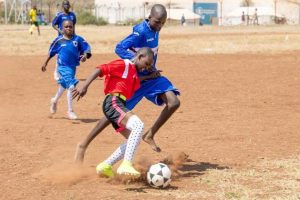Football the lifeblood of world’s largest refugee camp
 Football has become part of the fabric of young people’s lives in the sprawling Kakuma refugee camp in Kenya, allowing young refugees to showcase their talents and follow their dreams.
Football has become part of the fabric of young people’s lives in the sprawling Kakuma refugee camp in Kenya, allowing young refugees to showcase their talents and follow their dreams.
Young people account for the majority of the 275,000 refugees living in Kenya, and football is by far the most popular pastime.
It has become part of Kakuma’s fabric, with 26 professional men’s and women’s teams and hundreds more amateur sides, providing a rare opportunity for youngsters to express themselves and channel their ambitions.
Football has also become an important uniting force among the diverse communities in the camp, bringing together players from different cultures and backgrounds.
Local UNHCR spokesman Nicolas Kaburaburyo said football was now engrained in the social fabric of the camp.
“Kakuma has a long history of sporting achievement and UNHCR understands that sport can be an important tool for protection,” he said.
“Here in the camp, football gives refugees a sense of belonging, boosts their self-confidence and offers a source of hope away from home. We will continue to work with the refugee community and partners to enhance sports activities,” Mr Kaburaburyo said.
Despite the talent and drive of many of the young players in the camp, their dreams of becoming professional footballers face a number of challenges, including a lack of decent equipment and space to play as many pitches become swallowed up to house the increasing camp population.
There are not enough balls and jerseys, but the young people have risen above these challenges to create a vibrant football community.
Sprawling Kakuma, the world’s largest refugee camp, in the desert region of north-west Kenya is home to about 200,000 refugees, many of whom have lived there for more than 25 years after fleeing conflict and climate extremes in their home countries, which include South Sudan, Sudan, Somalia, the Democratic Republic of the Congo, Burundi, Ethiopia and Uganda.
Kakuma residents face relentless dust storms, high temperatures and malaria outbreaks.
Under Kenyan law, they are required to remain in the camp and children entering the camp often stay into adulthood.
The camp was established in 1991 to host unaccompanied minors who had fled the war in Sudan and from camps in Ethiopia. It was estimated that there were 12,000 “lost boys and girls” who had fled here via Egypt in 1990-91.
Malnutrition, communicable disease outbreaks, and malaria are all ongoing problems, while donor support has faltered due to conflicts in other parts of the world.
In 2016, Kakuma Refugee Camp became the first recipient of the Ockenden International Prize, an esteemed international prize that recognizes and supports projects that promote the self-reliance of refugees and displaced individuals.












